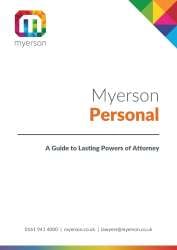Mr and Mrs Myerson are married. Mrs Myerson has become a little forgetful and can get confused at times.
Mrs Myerson’s doctor has diagnosed her with Alzheimer’s in its early stages. Neither Mr. nor Mrs. Myerson has LPAs.
Mr and Mrs Myerson make an appointment with their Solicitor. Their Solicitor chats with Mr and Mrs Myerson to understand their capacity, particularly for Mrs Myerson.
They discuss family members, finances (assets, liabilities, income, and expenditures), recent trips abroad, and plans for the upcoming holidays.
The Solicitor then talks to Mr and Mrs Myerson about the purposes of the LPAs and the various options for structuring the documents.
Mr and Mrs Myerson then convey their instructions and their reasoning.
If the Solicitor is satisfied that Mrs Myerson (as well as Mr Myerson) understands the documents and has the necessary capacity to make the LPAs, the Solicitor will draft the documents, arrange a second meeting to sign them and prepare for them to be registered.
If the Solicitor has any doubts, they will refer to a medical professional and ask Mrs Myerson’s Doctor or a capacity assessor to provide their opinion.
If the medical professional is satisfied, the Solicitor will draft the documents, arrange a second meeting to sign them and prepare them to be registered.
When Mrs Myerson cannot make decisions for herself, her chosen attorneys will be able to look after her finances, make decisions about where she should live (along with paying for any care), and decide what treatments she should have.















